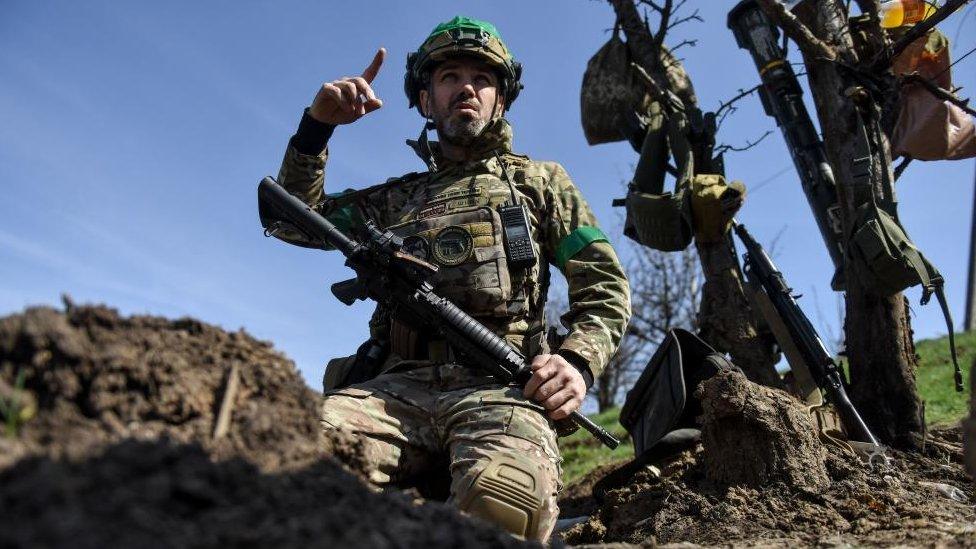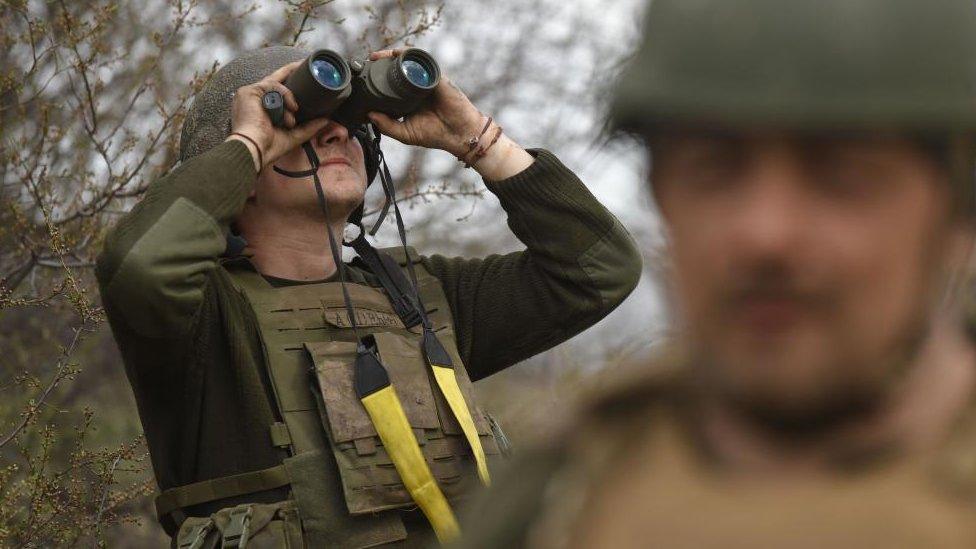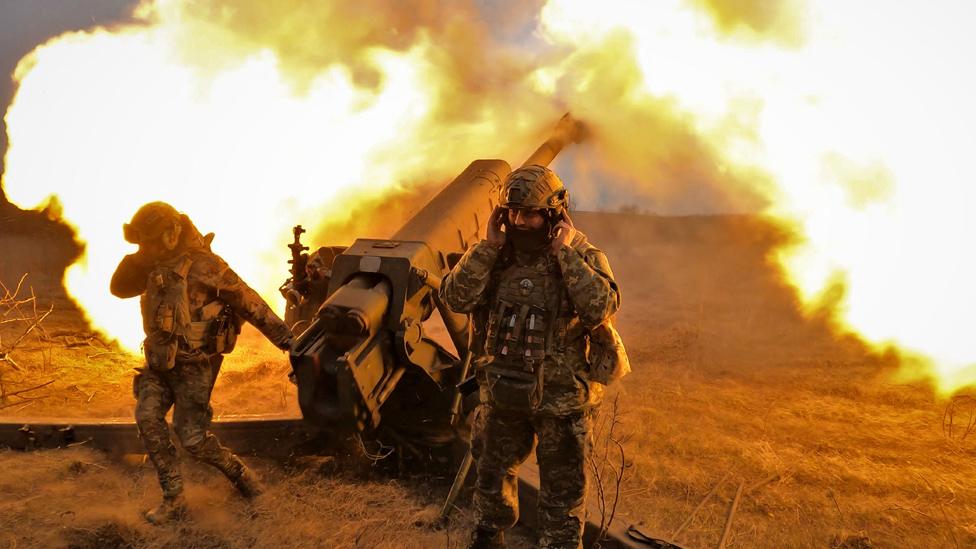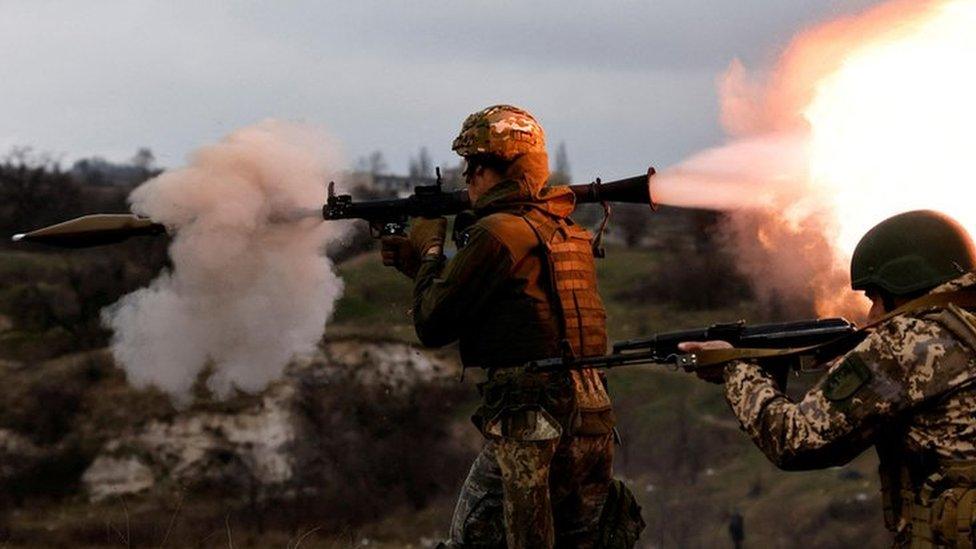What punishment could Pentagon files leaker face?
- Published

The leaked documents appear to include sensitive information about a planned Ukrainian offensive against Russian troops.
The young military cyber specialist suspected of leaking sensitive US documents faces a lengthy prison sentence if convicted of involvement in what the Pentagon has deemed a "very serious" national security risk, experts say.
The documents appear to include classified intelligence regarding the Ukraine-Russia war, as well as on China and US allies such as Israel, South Korea and Canada.
On 13 April, the mystery surrounding the leaker's identity appeared to have been solved with the arrest of Jack Teixeira, a 21-year-old member of the Massachusetts Air National Guard.
According to US Attorney General Merrick Garland, Mr Teixeira was arrested "without incident" in connection with "the investigation into alleged unauthorised removal, retention, and transmission of classified national defence information".
The leak of the documents - which officials have said are in a format similar to that of documents issued to senior leaders - has also prompted a Pentagon review of how classified files are shared, and who gets access. The pool of people with access to this material, officials have said, was relatively small.
WATCH: Former CIA analyst says 'dire future’ awaits leaker
Before Mr Teixeira's arrest, experts said the culprit could face a prison sentence plus heavy financial penalties.
Here's what we know about the investigation and potential consequences.
How did the government find the source of the leak?
So far, US officials have remained largely quiet on the probe into the documents leak and how they came to identify Mr Teixeira as a suspect.
The investigation, officials have said, was carried out by the justice department in co-ordination with the Pentagon, the White House, the Department of State and other parts of the US government.
Steven Stransky, an attorney who previously served as senior counsel to the Department of Homeland Security's Intelligence Law Division, told the BBC that US officials will review the documents and their classification levels and seek to work out "how the information was removed or exfiltrated from the Department of Defense's information technology environment".
"That involves both traditional interviewing and interrogation, as well as the technical security controls that were in place to identify whether or not classified emails were sent to individuals who shouldn't get access to them," Mr Stransky added.
Will the source of the leak be charged with espionage?
Mr Teixeira is facing charges under the Espionage Act, a federal law enacted in 1917 that has formed the basis for previous convictions of spies and those who have shared classified information with the press and the public.
Ahead of the arrest, Mr Stransky said that while the Espionage Act is "very old and outdated", it "essentially criminalises an individual collection, disclosure or potentially re-disclosure, of national defence information".
He added that while the term "national defence information" is only vaguely defined in the law, it broadly means information that "can injure the United States or put us at a disadvantage vis-a-vis another third country".

WikiLeaks source Chelsea Manning is among those who have faced charges for leaking classified US documents.
The Espionage Act is used very infrequently, and has historically largely been applied to Americans found spying for foreign countries such as Julius and Ethel Rosenberg, who were executed in 1953 after being found guilty of passing nuclear secrets to the Soviet Union.
It has, however, also been applied to whistleblowers and people who have leaked sensitive information, including Wikileaks source Chelsea Manning, ex-CIA contractor Edward Snowden and Henry Kyle Frese, a Defence Intelligence Agency employee convicted of disclosing classified information to two reporters in 2018 and 2019.
When the Espionage Act was originally passed, it stipulated prison sentences of 20 years or less and fines of up to $10,000 per charge.
Prison sentences and fines are still possible and could quickly add up if Mr Teixeira is convicted of multiple charges - even if he did not mean to intentionally harm US interests.
"There's certainly criminal charges that could attach to it [the Espionage Act] and there's financial penalties as well," Mr Stransky said. "If the justice department is pursuing a criminal violation for the Espionage Act, they're most often looking for jail sentencing as a way to deter these types of future actions."
Henry Kyle Frese, for example, was sentenced to 30 months in prison, while Chelsea Manning was originally sentenced to 35 years, of which she served seven.
Earlier, in 1973, Pentagon Papers leaker Daniel Ellsberg faced a possible sentence of 115 years in prison for violations of the Espionage Act and theft and conspiracy charges stemming from his release of a top-secret Pentagon study on the Vietnam War.
Can people get in trouble for sharing the documents?
According to Mr Stransky, the plain text of the Espionage Act does not differentiate between the original source of information, the platform it was leaked on or whether - or not - those sharing it are within the government.
Legally speaking, this means that anyone sharing the documents could be "equally liable for breaking the law", he added.
In practice, however, it is unlikely that recipients outside the US government would be charged, as the prosecution of third-party recipients of classified documents raises constitutional concerns.
The justice department has rarely elected to prosecute recipients, with the notable exception of Julian Assange and two staff members at the American Israel Public Affairs Committee, Steven Rosen and Keith Weissman, who received classified US documents regarding Iran in 2003.
How will the government prevent more leaks from taking place?
In 2011, under the administration of President Barack Obama, the US government announced the creation of a "National Insider Threat Task Force", in part to address the safeguarding of classified information within the US government.
As part of the initiative, federal government entities were required to set up programmes to ensure that data leaks - such as Wikileaks and the Snowden disclosures - didn't happen again. This included the strict monitoring of employees, computers and classified networks.
In the wake of the recent leak, Mr Stransky said that the government will be taking a hard look at those programmes to see what improvements can be made.
Watch: This expert says US and Egypt seem ready to move forward after the leak
"They'll be looking to see what type of oversight was done with the task force and how they have been complying with their mandate to enforce these types of restrictions," he said.
"Whether or not those activities are being complied with is something that's probably classified, and it will be interesting to see whether there's now any congressional oversight of how the task force has been implementing its mandate for the last decade."
In the wake of Mr Teixeira's arrest, Mike Turner, the Chairman of the House Intelligence Committee, issued a statement vowing to "examine why this happened, why it went unnoticed for weeks, and how to prevent future leaks."
- Published11 April 2023

- Published15 April 2023

- Published10 April 2023

- Published11 April 2023
